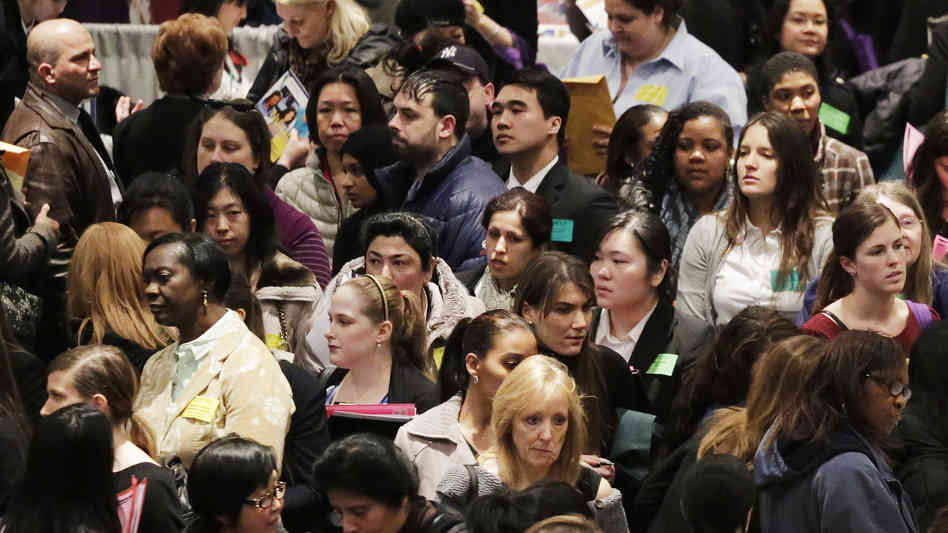
Job seekers (Mark Lennihan/AP)
Advocates for the poor rallied last month for additional summer youth jobs. City Councilman Jumaane Williams said many youth in the city have to decide between getting a legitimate job or turning to drug dealing to make money. "It is unfair to ask young people to make the correct choice when we give them no choice," Williams said.
While there is something positive about summer employment, much more substantial benefits come from year-round part-time employment. As Councilman Williams points out, teens from poor families have substantial consumption needs, but these needs are year round. Unfortunately, the teen employment rate in 2013 was little more than half what it was fifteen years ago as firms shifted to young adults and retirees. Nationally, only one in ten black teenagers from low-income households is employed. While I strongly endorse a minimum wage increase, there is some evidence that it may accelerate this shifting of employment to older workers.
Legal employment for young men reduces the temptation to engage in illegal activities. Less discussed, is the impact of joblessness on young women. Without paid employment, many must rely on male partners; men who will demand sexual favors that put these young women at risk for sexually transmitted diseases and unwanted pregnancies. These problems are most pronounced for disadvantaged black teen women whose incidence of gonorrhea and chlamydia are at least seven times the rate for white teen women. Each year in New York, 13 percent of black teen women becomes pregnant - a rate 3.5 times higher than the white rate. While paid employment is not a magic bullet, it will help many young women avoid these risks.
Continuous teen employment has other benefits. The Community Service Society recently documented the substantially higher graduation rates for black and Latino students who attended Career and Technical Education (CTE) High Schools. These CTE programs not only prepare students with the academic skills necessary to succeed in the world of work, but also provide mentoring and the work skills needed, including team work, work discipline, and communication skills. Many of these same skills are developed through paid teen employment.
There are already a number of programs that aid disadvantaged youth. Year Up is a successful program to prepare promising students for demanding occupational programs that lead to backroom employment in the financial sector. Other programs focus on disconnected youth who are neither in school nor employed. None of these programs, however, focus on high school students who are at risk of not graduating. There is a crucial need to introduce to the world of private-sector paid employment this large group of disadvantaged students before they become disconnected from school and work.
There are a number of ways that government support can move significant numbers of students into year-round part-time private-sector employment. In the 1990s, the government shifted many long-term welfare recipients into the workforce; and continues to have a number of programs that move ex-offenders into paid employment. As in both cases, a critical component of work-readiness programs is preparing participants for the behavioral traits private-sector employers require; and ongoing counseling to help facilitate effective employment.
Besides the work readiness and ongoing counseling, other modest incentives can be given to the national retail chain stores and fast food establishments to induce them to increase their teen employment. In addition, government should find ways to induce firms that provide summer employment to extend, for a modest proportion, employment into the school year. Once hired, employment counselors can help students to balance work and school and to develop strategies to reduce risky sexual behavior. By providing soft skills, mentoring, and spending money, year-round employment could move disadvantaged youth forward.
***
by Robert Cherry, Stern Professor of Economics, Brooklyn College and the Graduate Center of CUNY
***
Have an op-ed idea or submission? Send it to Executive Editor Ben Max: This email address is being protected from spambots. You need JavaScript enabled to view it.




